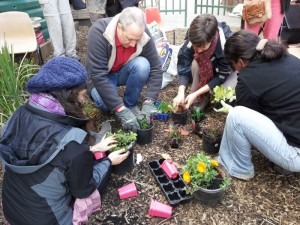“I go to nature to be soothed and healed, and to have my senses put in tune once more” – John Burroughs (1837-1921), American naturalist and writer.
Gardening is a very healthy hobby, on so many levels. It’s not just about filling our tummy either, there’s a lot more to be had from a well designed garden than a tasty meal!
Studies show that gardening promotes physical health, mental health through relaxation and satisfaction, and better nutrition [Source: Wakefield].
Gardening can indeed feed the body, mind and spirit! And that’s important for a sustainable society.
Gardening for the Body
The primary reason why people decided thousands of years ago to grow plants was to sustain their bodies. This is still a very valid reason today, but there are many other reasons why gardening is beneficial to our physical health.
Some of these are:
- Stress relief
- Exercise
- Brain health
- Nutrition
- Healing
- Immunity
Stress relief – A study in the Netherlands indicated that gardening is better at relieving stress than other relaxing leisure activities. Two groups of people were required to complete a stressful task, one group did some gardening for 30 minutes while the other group did some reading indoors over the same time. The gardening group reported being in a better mood than the reading group, and they also had lower levels of the stress hormone cortisol [1].
Exercise – The activity of gardening is also good for our bodies. It’s healthy regular physical exercise which helps prevent of heart disease, high blood pressure, obesity, adult-onset diabetes and osteoporosis. Researchers at Kansas State University already have shown that gardening can offer enough moderate physical activity to keep older adults in shape [2]. This was confirmed when other researchers concluded that gardening is a great way for older adults to meet the physical activity recommendations set forth by the Center for Disease Control and Prevention and the American College of Sports Medicine [3] .
Brain health – A study that followed people in their 60s and 70s for up to 16 years found that those who gardened regularly had a 36% lower risk of dementia than non-gardeners, even when a range of other health factors were taken into account [4].
Nutrition – Studies have shown that gardeners eat more fruits and vegetables than other people. The freshest food you can eat is the food you grow, and when you have access to a garden filled with fruits and vegetables, you’re able to eat some of the healthiest food you can get! A European study found that people who consume more fruit and vegetables have a lower risk of dying from ischaemic heart disease [5].
Healing – Interacting with nature also helps our bodies heal. A landmark study by Roger S. Ulrich, a pioneer in the field of therapeutic environments at Texas A&M University, published in the April 27, 1984, issue of Science magazine that patients recovering from gallbladder surgery who looked out at a view of trees had significantly shorter hospital stays, fewer complaints, and took less pain medication, than those who looked out at a brick wall [6].
Immunity – In 2007, University of Colorado neuroscientist Christopher Lowry, then working at Bristol University in England, made a startling discovery. He found that certain strains of harmless soil-borne Mycobacterium vaccae sharply stimulated the human immune system. It’s quite likely that exposure to soil bacteria plays an important role in developing a strong immune system [7].
Gardening for the Mind
Better mental health
The same Mycobacterium vaccae, stimulates the immune system of mice and has also boosts the production of serotonin, a mood-regulating brain chemical. Low levels of serotonin are associated with depression. Contact with soil in the garden may actually elevate our mood [7].
The antidepressant properties of M.vaccae were discovered accidentally while being used for experimental human lung cancer treatment by cancer researcher Mary O’Brien at the Royal Marsden Hospital in London, England. After the patients were treated with heat-killed inoculations of the bacteria, O’Brien’s team observed not only fewer symptoms of cancer, but also improvements in their patients’ vitality, emotional health and mental abilities.
Researchers often find that subjects who participate in gardening have a positive mental outlook [8] [9] [10]. Studies reported in the Journal of Health Psychology in 2012 also show that people who feel a connection to nature are indeed happier [11].
Gardening can help prevent dementia in seniors [12]. Gardening requires you to use think, learn and use your creativity. By keeping the mind active, it serves as a protective measure against such degenerative diseases.

We must also remember that we humans are social creatures, and we maintain psychological and emotional health by interacting with one another in some form of community. Gardening connects you with people and community gardens provide an ideal opportunity for people to interact with each other. Research indicates that local gardening brings about a better sense of community [8] [9] [10].
Gardening for the Spirit
Harvard naturalist and Pulitzer Prize winner Edward O. Wilson, who coined the term biophilia (love of living things) believes that Nature holds the key to health. He believes that we have an affinity for Nature because we are part of it and would prefer to look at flowers and grass rather than concrete or steel. As part of the natural world, we are connected to and restored by it.
A garden can also serve our higher needs, it can provide a harmonious space to relax, unwind, reflect and restore ourselves. It can serve as a place where we can appreciate the beauty, form and colours of Nature.
Gardening reconnects us to natural cycles which are the rhythm of life itself. When we spend time in the garden, we learn to slow down, and when we get absorbed in our activities, we lose sense of all time and space, we forget out daily worries and concern, and we lose ourselves in ‘the zone’, a blissful Zen state where we are totally immersed in our activities and that timeless moment.
According to Clare Cooper Marcus, MA, MCP, professor emerita from the University of California at Berkeley, and one of the founders of the field of environmental psychology, one of the reasons why Nature may be so successful at reducing stress is that it puts the mind in a state similar to meditation. When you engage Nature, you naturally stop thinking, obsessing and worrying. Your senses are awakened, which brings you into the present moment, and this has been shown to be very effective at reducing stress, says Marcus, drawing on her own observations [13].
At the 1999 Culture, Health, and the Arts World Symposium in England beneficial effects of just even looking at nature were reported. In one study, conducted in Uppsala, Sweden, 160 postoperative heart patients were asked to look at a landscape, an abstract art work, or no picture. Those who looked at the landscape had lower anxiety, required less pain medicine, and spent a day less in the hospital than the control group patients [13].
To reap these restorative benefits of Nature, all we need to do is plant a few flowers or herbs and enjoy Nature’s gift to us!
In Conclusion
By creating a space where we can reconnect with Nature, we can provide ourselves the means to heal our mind, body and spirit, and a means heal the planet also. When we grow gardens, we grow life, which we care for, nurture and partake in.
To quote the Permaculturist Geoff Lawton – “All the world’s problems can be solved in a garden”
Text and photo credit: Angelo Eliades
References:
Van Den Berg AE, Custers MH.- Gardening promotes neuroendocrine and affective restoration from stress, 2011
Science Daily – Gardening Gives Older Adults Benefits Like Hand Strength And Self Esteem, 2009
American Society for Horticultural Science – Gardening Provides Recommended Physical Activity For Older Adults, 2008
Leon A Simons, et al – Lifestyle factors and risk of dementia: Dubbo Study of the elderly, 2006
European Society of Cardiology – Eating more fruit and vegetables is linked to a lower risk of dying from ischemic heart disease, 2011.
Ulrich RS – View through a window may influence recovery from surgery, 1984
Lowry CA, et al – Identification of an immune-responsive mesolimbocortical serotonergic system: potential role in regulation of emotional behaviour, 2007
Wakefield, S. – Growing urban health: community gardening in South-East Toronto, 2007.
Lombard, KA., et al – Diabetes on the Najavo nation: what role can gardening and agriculture extension play to reduce it, 2006.
Armstrong, D. – A survey of community gardens in upstate New York: implications for health promotion and community development, 2000.
Renate Cervinka, Kathrin Röderer and Elisabeth Hefler – Are nature lovers happy? On various indicators of well-being and connectedness with nature, 2011
Fabrigoule, C. – Social and leisure activities and risk of dementia: a prospective longitudinal study, 1995
WebMD Feature – Gardening for Health, http://www.webmd.com/healthy-aging/features/gardening-health.
Related Articles:
What to do for Flooded Gardens
What to do for flooded gardens is, unfortunately, a question more people need to ask. It seems that our climate is making extreme rainfall and…
Using Gardening for Therapy
Using gardening for therapy is the cornerstone of Kevin Heinze GROW (KHG), a social enterprise operating in the Doncaster and Coburg suburbs of…



